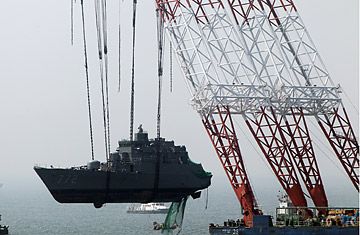
The front half of a sunken South Korean naval ship is lifted from waters near the disputed Yellow Sea border with North Korea at Baengnyeong Island
(2 of 2)
Which is why it's unlikely to happen. Beijing to date has never evinced any serious interest in bringing the economic hammer down on Pyongyang. It values stability over anything else, and the death of 46 South Korean sailors is unlikely to change that view. It took China a month, in fact, to offer Seoul its condolences after the attack. Moreover, Kim no doubt pleaded his case about the Cheonan attack during the Dear Leader's recent visit to Beijing. From the North's perspective, it was a strike in retaliation for another naval clash in November 2009 in the West Sea, when an undetermined number of North Korean sailors were killed. Pyongyang's military doctrine, North Korea watchers in Seoul say, has always stressed retaliation for anything that smacks of defeat in an individual skirmish, and indeed there have been South Korean media reports since the Cheonan sinking that those military officers who pulled it off have been promoted. China, says Cheong Seong-chang, a fellow at the Sejong Institute, will weigh carefully how detailed and convincing the evidence Seoul presents before deciding what kind of sanctions it will be willing to go along with at the U.N.
Seoul's options are limited, given how paltry economic ties between the Koreas are. It may choose to shutter the Kaesong special economic zone just across the border in North Korea, where more than 100 South Korean companies, mainly in light industry like textiles, have factories employing about 40,000 North Koreans. (Though even that move would be unpopular with the South Korean employers, who use the factories to compete with inexpensive Chinese imports.)
That means the U.S. needs to decide how much heavy lifting it will do beyond backing new U.N. sanctions. Plausibly, Washington could once again add North Korea to the State Department's list of state sponsors of terrorism. President Bush took Pyongyang off the list in 2008. But arguably the most effective measure Washington could take would be for the Treasury Department to again go after any international financial institution that handles North Korean money — whether it be trade finance or funds laundered by senior leaders in Pyongyang — by cutting off their access entirely to the U.S. It was precisely this form of a sanction a few years ago — which centered on a Macao-based bank called Banco Delta Asia — that infuriated the North Koreans. So much so, in fact, that some analysts believe it led to the North's first major act of nuclear defiance: its initial test in the autumn of 2006. Cheong of the Sejong Institute believes that if the U.S. again seeks tough, targeted financial sanctions, the result will probably be the same: Pyongyang's third nuclear test.
He may be right. Such is the nature of trying to coerce Kim Jong Il into something remotely resembling acceptable behavior. Unless China decides that that day must come, it probably won't.
— With reporting by Stephen Kim / Seoul
